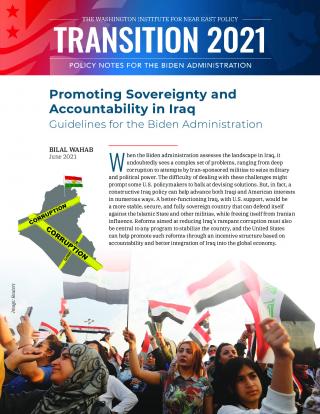Part of a series: Transition 2021
or see Part 1: The Coming Iran Nuclear Talks: Openings and Obstacles
The complexity of Iraq’s challenges might prompt some U.S. officials to balk, but a constructive policy can help advance both Iraqi and American interests in areas ranging from counterterrorism to economic development.
- Policy Analysis
- Policy Notes 106
Media www.rajawalisiber.com – In the tenth in a series of TRANSITION 2021 memos, Bilal Wahab offers insights on the complex dynamics in today’s Iraq. When U.S. officials assess the Iraqi scene, they see intractable problems ranging from deep corruption to incessant power grabs by Iran-sponsored militias. The difficulty of dealing with these challenges might prompt some policymakers to balk at devising solutions, but a constructive Iraq policy can help advance both Iraqi and American interests in numerous areas. A more stable Iraq, for its part, could better defend itself against a resurgent Islamic State while curtailing Iranian influence.
The author elaborates that Baghdad, reinforced in this way, could help “improve regional security, increase the flow of petroleum—a necessity even amid the urgent global shift toward renewable energy sources—and create economic opportunity for the country’s 40 million citizens as well as neighboring states.”
TRANSITION 2021 memos by Washington Institute experts address the broad array of issues facing the Biden-Harris administration in the Middle East. These range from thematic issues, such as the region’s strategic position in the context of Great Power competition and how to most effectively elevate human rights and democracy in Middle East policy, to more discrete topics, from Arab-Israel peace diplomacy to Red Sea security to challenges and opportunities in northwest Africa. Taken as a whole, this series of memos will present a comprehensive approach for advancing U.S. interests in security and peace in this vital but volatile region.
This project was supported by the Nathan and Esther K. Wagner Family Foundation—sponsor of the author’s fellowship—and other donors to the Institute’s Transition 2021 series.


